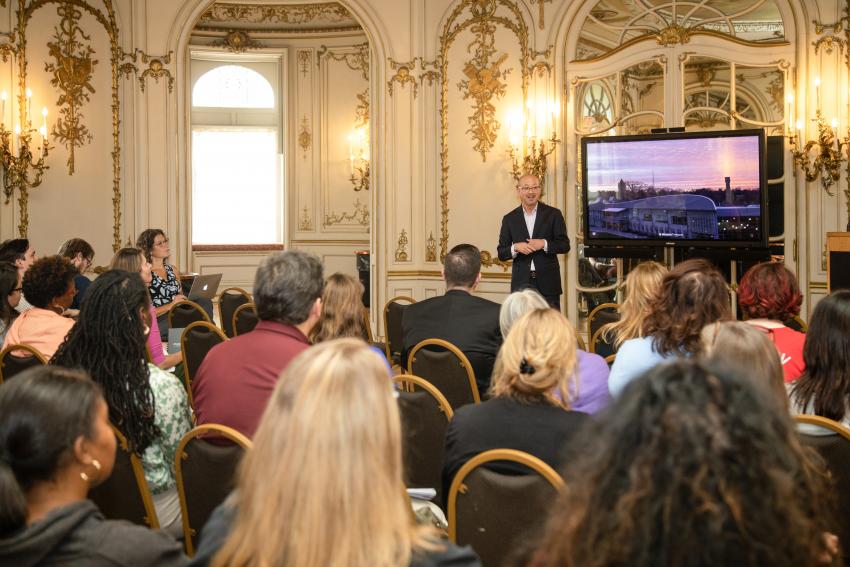JEDI Hosts Dr. Kumashiro for Discussions on Diversity, Inclusion, and Equity

Dr. Kevin Kumashio speaks to a group in the castle.
Dr. Kevin Kumashiro, an internationally recognized expert on educational equity and social justice, noted in his discussion with members of the Arcadia community on Sept. 26 and 27 that no higher education institution has yet become an inclusive and equitable organization to meet the needs of all its students. But he had hope, especially at Arcadia.
The President’s Commission on Justice, Equity, Diversity, and Inclusion (JEDI), co-chaired by Dr. Graciela Slesaransky-Poe, professor of Education, and Joseph Sun, director of Strategic Initiatives, welcomed Dr. Kumashiro to campus for two days to discuss justice, equity and inclusion in all roles at the institution.
On Sept. 26, Dr. Kumashiro co-facilitated three community events: an inaugural mini-retreat for the members of the Commission, which is comprised of faculty, staff, administration, students, and alumni; “Justice, Equity Diversity, and Inclusion as a Frame for Teaching” open to all faculty; and then an Open Forum for faculty, staff, administrators, and students, titled “Justice, Equity Diversity, and Inclusion in Higher Education and at Arcadia University.” Additionally, Dr. Kumashiro lead two workshops on Sept. 27 for the Board of Trustees and President’s Cabinet, titled “JEDI as a Frame for Leadership.”
Dr. Slesaransky-Poe said that while community members had been working toward a more inclusive, just, and equitable campus, JEDI is the first University-wide taskforce to bring those pieces together.
“This is the first day of re-energizing and thinking innovatively about the work of JEDI, but the initiatives have been here,” said Dr. Slesaransky-Poe. “We want to set up a structure that is sustainable.”
Dr. Kumashiro sparked discussion among the more than 50 members of the community who attended the meeting, asking: What does the successful achievement of equity and inclusion look like? How do you address situations where justice and equity clash? And what is Arcadia’s contribution to solving these issues?
“We need to have a conversation about supporting all students with the resources they need,” said Dr. Kumashiro. “Inclusion is far more than just representation—it’s about the experience. Our attempts to create inclusive spaces have consequences, and we need to do more.”
Dr. Kumashio said that too often diversity is looked at in a multiplicity way, rather than intersectionally. When someone is seen in a multiplicity way, their identity isn’t seen as a whole; rather, they find a safe place for a part of it. He challenged Arcadia to welcome the whole student and support all accessibility, whether that’s financial, physical, linguistic, or something unique to the individual.
“It’s important for senior leadership to get into these spaces and discussions,” said Provost and Senior Vice President for Academic Affairs Dr. Jeff Rutenbeck. “We’re re-engineering the culture at Arcadia. It’s got to be a much more consistent effort to challenge and rethink our community.”


